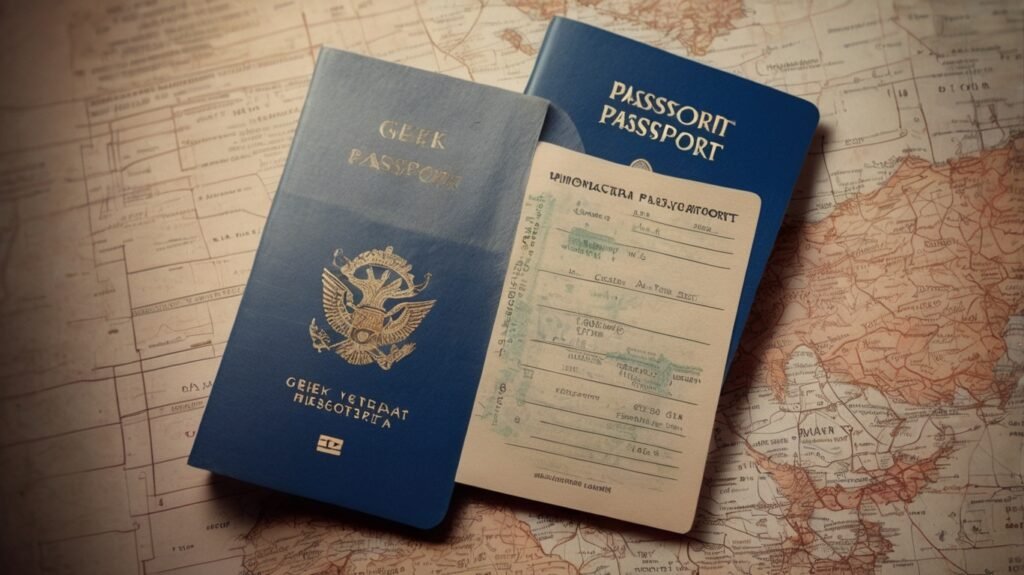Introduction
Greece, renowned for its stunning landscapes, rich history, and vibrant culture, stands as a must-visit destination for travelers around the world. Whether you are captivated by the ancient ruins, enchanted by the picturesque islands, or drawn to the bustling cities, Greece offers a diverse range of experiences that cater to every interest. If you are planning a short-term stay in Greece in 2024, it is essential to be aware of the visa requirements to ensure a smooth and enjoyable visit.
To enter Greece for a short duration, you will need to apply for a Type C visa, also known as a short-stay or Schengen visa. This visa is designed for those intending to stay in Greece for up to 90 days within any 180-day period. It accommodates various purposes including tourism, business, family visits, and other short-term activities. The Greece Type C visa not only grants you entry to Greece but also allows travel within the entire Schengen Zone, making it a valuable document for travelers.
This blog post is dedicated to guiding you through the essential requirements necessary to obtain your Greece Type C visa in 2024. By understanding these requirements, you can better prepare your application and avoid any potential pitfalls. From documentation to financial proof, we will cover all the critical aspects that ensure your application meets the criteria set by the Greek authorities. Whether you are a frequent traveler or a first-time visitor, this comprehensive guide will serve as an indispensable resource in your journey towards securing your Greece Type C visa.

Completed Visa Application Form
The initial and fundamental step in the application process for a Greece Type C Visa 2024 is the completion of the visa application form. This document serves as the cornerstone of your entire application, requiring meticulous attention to detail and accuracy. The visa application form is designed to gather comprehensive information about the applicant, including personal details, travel itinerary, and the primary purpose of the visit to Greece.
Personal information such as full name, date of birth, nationality, and passport details must be filled in precisely as they appear on your official documents. Any discrepancies between the information provided in the application form and your supporting documents can lead to unnecessary delays or even rejection of the visa application. Additionally, applicants are required to specify their travel plans, including dates of arrival and departure, accommodation details, and travel companions, if any.
The purpose of your visit is another critical component of the application form. Whether you are traveling for tourism, business, family visits, or any other reason, it is imperative to clearly state and provide evidence supporting your claim. For example, business travelers may need to furnish an invitation letter from a Greek company, while tourists might provide hotel reservations or a detailed travel itinerary.
It is essential to review the form thoroughly before submission to ensure that all sections are completed accurately. Incomplete or incorrect forms are a common cause of visa application rejections. Therefore, applicants are advised to double-check their entries and seek clarification if any section of the form is unclear. Professional assistance or consultation with a visa expert can also be beneficial in ensuring that the application form is filled out correctly.
By paying careful attention to the completion of the visa application form, applicants can significantly enhance their chances of a smooth and successful application process, paving the way for an enjoyable and hassle-free visit to Greece in 2024.
Application Form
Application Form (English-Russian)
Application Form (Arabic-French)
Application Form (English-Chinese)
Data Protection Information to the Public
Valid Passport
Obtaining a Greece Type C Visa for 2024 necessitates a valid passport meeting specific criteria. Primarily, your passport must remain valid for at least three months beyond your intended departure date from Greece. This ensures that you have sufficient validity to cover unexpected delays or extended stays within the Schengen Area.
Moreover, your passport should contain at least two blank pages. These pages are essential for affixing the visa sticker and for entry and exit stamps, which are mandatory for tracking purposes during your travel. Without adequate blank pages, your application may face rejection or delays, potentially affecting your travel plans.
In addition to the original passport, you must provide photocopies of the passport’s data page. This page includes crucial information such as your photograph, personal details, and passport number, which are necessary for processing your visa application. These photocopies serve as a backup to verify your identity and passport details in case the original document is misplaced or damaged.
Furthermore, if you have previously been issued any Schengen visas, you must submit photocopies of these as well. Providing copies of past Schengen visas helps demonstrate your travel history and compliance with previous visa conditions. It can expedite the assessment of your current application by showcasing your reliability as a traveler.
Ensuring that your passport meets these requirements is a pivotal step in the Greece Type C Visa application process. Failing to adhere to these guidelines can result in application delays or rejections, complicating your travel arrangements. Therefore, it is advisable to review your passport’s validity and blank pages well in advance of applying for your visa, and to prepare the necessary photocopies to facilitate a smooth application process.

Proof of Accommodation
When applying for a Greece Type C Visa, one of the essential requirements is to provide proof of accommodation for the entire duration of your stay. This documentation is crucial as it demonstrates to the authorities that you have a confirmed place to reside while in Greece, ensuring you will not be without shelter during your visit.
There are several acceptable forms of proof of accommodation that visa applicants can submit. The most common form is a hotel reservation. This reservation must be confirmed and should clearly state the hotel’s name, its full address, and the dates of your stay. Ensure that the reservation covers your entire trip to avoid any issues with your visa application.
For those opting to stay in a rented property, a rental agreement is required. This agreement should include detailed information about the property, including its address, the landlord’s name, and the duration of the lease. The rental agreement must also be signed by both the tenant and the landlord, confirming the arrangement.
If you plan to stay with friends or family in Greece, you will need to provide an invitation letter from your host. This letter should include the host’s name, address, and a statement confirming that they will accommodate you during your stay. Additionally, it is beneficial if the host provides a copy of their ID or passport and proof of residence, such as a utility bill, to substantiate their address.
It is important to ensure all documents submitted are clear and legible. Any discrepancies or incomplete information could lead to delays or even the denial of your visa application. Therefore, it is advisable to double-check all details before submission to ensure a smooth and successful visa application process.
Travel Itinerary
A comprehensive travel itinerary is a crucial component when applying for a Greece Type C Visa in 2024. This document serves as evidence of your planned activities and schedule during your stay, providing the visa officers with a clear understanding of the purpose of your visit. Your itinerary should encompass several key elements, beginning with round-trip flight bookings. While it is not mandatory to purchase the tickets before your visa is approved, you are required to present proof of reservation. This ensures that you have a planned entry and exit from Greece within the permitted timeframe.
In addition to flight details, your itinerary should outline any internal travel arrangements. This includes any domestic flights, train journeys, or car rentals you have planned within Greece. Providing these details demonstrates that your trip is well-organized and that you have considered how you will travel between destinations within the country.
Furthermore, listing your planned activities is essential. Include information about the places you intend to visit, such as historical sites, museums, or any events you plan to attend. If your trip involves attending a conference or a business meeting, ensure to include the schedule and location of these engagements. This not only substantiates the purpose of your trip but also gives the visa officers confidence in your commitment to returning within the visa’s validity.
Lastly, accommodation details should be included in your travel itinerary. Proof of hotel reservations or other lodging arrangements for the duration of your stay is necessary. This shows that you have secured a place to stay and have planned your trip responsibly.
By meticulously detailing your travel itinerary, you significantly bolster your Greece Type C Visa application, demonstrating thorough preparation and a clear intention of adhering to the visa’s conditions.
Travel Insurance
Securing travel insurance is an indispensable requirement when applying for a Greece Type C visa. This policy is not merely a formality, but a crucial safety net, safeguarding your well-being throughout your stay in the Schengen area. The travel insurance must encompass a broad range of coverage, including medical expenses, hospitalization, and repatriation. Such comprehensive coverage ensures that in the event of unexpected health issues, you are protected against the potentially prohibitive costs of medical treatments or emergency evacuations.
Specifically, the travel insurance policy must offer a minimum coverage of €30,000. This amount is set to cover significant medical expenses and ensure that you receive adequate care without financial strain. Additionally, the insurance must be valid for the entire duration of your stay, thereby providing continuous protection from the moment you enter any Schengen country until your departure.
It is also imperative that the travel insurance policy is recognized and valid across all Schengen countries. This requirement ensures that no matter where your travels take you within the Schengen zone, you are consistently covered. The uniformity of insurance validity across these countries is vital, given the fluidity of movement within the Schengen area, which permits travelers to cross borders without undergoing additional checks.
When selecting a travel insurance provider, it is advisable to verify that the policy meets all the stipulated requirements for the Greece Type C visa. Many insurance companies offer tailored packages specifically designed for Schengen visa applicants, simplifying the process. Ensuring that your travel insurance is compliant not only facilitates the visa application process but also provides peace of mind, allowing you to focus on enjoying your travels within Greece and beyond.
Proof of Financial Means
When applying for a Greece Type C Visa, demonstrating proof of financial means is a crucial requirement. Applicants must show that they possess sufficient funds to cover their expenses throughout their stay in Greece. This financial proof can be provided through various documents, each reflecting the applicant’s financial stability and capacity to support themselves during their visit.
One of the most common methods to demonstrate financial means is through bank statements. These statements should ideally cover the last three to six months and clearly show regular income, savings, and the current account balance. It is important to ensure that the bank statements are from a recognized financial institution and are printed on official bank letterhead. Additionally, the account holder’s name must match the name of the visa applicant to avoid any discrepancies.
Another acceptable form of financial proof is pay slips. These documents provide evidence of regular income and employment, which can reassure the visa authorities of the applicant’s financial reliability. Pay slips should typically cover at least the last three months and must be issued by the employer on official company letterhead, including details such as the employee’s name, salary, and employment duration.
In certain cases, an applicant might not have sufficient personal funds. In such scenarios, a letter from a sponsor can be submitted. The sponsor, who could be a family member or friend, must provide a formal letter stating their intent to financially support the applicant during their stay. This letter should be accompanied by the sponsor’s bank statements, pay slips, and a copy of their identification to verify their capability to provide the promised support.
The amount of funds required varies depending on the length of stay and the planned activities in Greece. Short-term tourists might need to show less financial backing compared to those intending to stay for longer durations or engage in activities that imply higher expenses. It is advisable to check the specific financial requirements set forth by the Greek consulate or embassy to ensure compliance.
Proof of Employment or Education
Securing a Greece Type C Visa necessitates the submission of adequate proof of employment or education to substantiate your application. For employed individuals, a crucial document is an official letter from your employer. This letter should comprehensively detail your job position, current salary, and confirmation of approved leave for the period you intend to travel. This information reassures the visa authorities about your intent to return to your job after your stay in Greece.
Students, on the other hand, must provide a letter from their educational institution. This letter must clearly state that you are currently enrolled in the institution and that you have been granted a leave of absence for the duration of your trip to Greece. This acts as proof of your ties to your home country and your commitment to continue your education upon returning.
For self-employed individuals, the requirements differ slightly. You need to submit copies of your business licenses or recent tax returns. These documents serve to verify your self-employment status and establish your financial stability. Providing such evidence is critical as it demonstrates that you have a consistent source of income and a professional obligation to return to.
Effectively presenting proof of employment or education not only strengthens your Greece Type C Visa application but also aligns with the visa authorities’ objective of ensuring that applicants have strong ties to their home country. Make sure all documents are current, accurately reflective of your situation, and properly attested, if required.
Cover Letter
When applying for a Greece Type C Visa for 2024, one of the essential documents you need to include is a cover letter addressed to the Greek consulate. This letter plays a crucial role in your visa application process as it provides the consular officers with a clear understanding of the purpose of your visit, the duration of your stay, and the specific places you intend to travel within Greece.
In your cover letter, you should begin by introducing yourself and stating the primary reason for your trip. Whether it’s for tourism, business, family visit, or any other purpose, clarity in your intent is paramount. Specify the dates of your planned stay, ensuring they align with the dates mentioned in other documents, such as your flight itinerary and hotel reservations.
Moreover, the cover letter should detail the locations you plan to visit in Greece. For instance, if you are visiting multiple cities or regions, list them along with a brief explanation of your itinerary. This helps the consulate understand your travel plans better and adds credibility to your application.
Additionally, if you are traveling with companions, mention their names and relationship to you. It is beneficial to explain the nature of your relationship and why you are traveling together, as this adds context to your application. If there are special circumstances related to your trip, such as attending a conference, medical treatment, or any other specific reason, be sure to provide relevant details.
Lastly, ensure that your cover letter is concise, well-structured, and free of any errors. A professionally written cover letter can significantly enhance the likelihood of your visa application being approved, as it reflects your seriousness and preparedness for the trip. By providing all necessary information in a clear and organized manner, you facilitate a smooth evaluation process for the consular officers.
Visa Fee Payment
The final step in the process of obtaining a Greece Type C Visa for 2024 is the payment of the visa application fee. This fee is a crucial component of your application and must be handled with precision to ensure your application is processed without delays. As of 2024, the visa fee is set at €80 for adults and €40 for children aged 6 to 12, reflecting a standard rate across all consulates.
It’s important to note that the methods of payment can vary depending on the consulate through which you are applying. Some consulates may accept payments through bank transfers, while others may require cash or credit card payments. Therefore, it is essential to verify the specific payment methods accepted by the consulate in your jurisdiction. This information can typically be found on the consulate’s official website or by directly contacting their office for detailed guidance.
Once the payment is made, you will receive a receipt as proof. This receipt is a critical document and must be included with your visa application. Failure to provide proof of payment can result in the rejection of your application. It is advisable to make copies of the receipt and keep them in a safe place, as the original receipt will need to be submitted with your application packet.
In addition to the receipt, ensure that all other required documents are correctly compiled and submitted. This includes the completed visa application form, passport-sized photos, travel itinerary, proof of accommodation, and any other supporting documents specified by the consulate.
By carefully following the payment instructions and maintaining meticulous records, you can streamline the application process and increase the likelihood of a successful outcome. This final step, while seemingly straightforward, is essential in securing your Greece Type C Visa for 2024.
Conclusion
Applying for a Greece Type C visa can initially appear daunting due to the various requirements and documentation needed. However, by ensuring you have all the necessary documents in order and by meeting all the outlined requirements, you can make the application process considerably smoother. It is essential to double-check all your paperwork to avoid any discrepancies that could delay your application. Following the guidelines provided by the consulate meticulously will further streamline your application procedure.
Another critical aspect of this process is to allow plenty of time for your application to be processed. Visa applications can sometimes take longer than anticipated, especially during peak travel seasons, so planning ahead is crucial. By starting the application process well in advance of your intended travel dates, you can accommodate any unforeseen delays and ensure that you receive your visa on time.
With the right preparation and attention to detail, obtaining a Greece Type C visa becomes a manageable task. Once you have successfully navigated the application process, you’ll be well on your way to experiencing the rich history, stunning landscapes, and vibrant culture that Greece has to offer in 2024. Your meticulous preparation will pay off as you embark on your journey to explore all the incredible experiences awaiting you in Greece.



2 Responses
Can you guys do all the paper works?
Hello Dear Nina
Yes, we do every things about paper works!
Please contact us!
Best Regard
Star Gate Group